Canadian Police College relies on partnerships for high-level training
By Derek Johnston

The Canadian Police College delivered more than 200 specialized courses in 2022 including investigative techniques, technological crime, forensic identification, and explosives disposal.
Image by Serge Gouin, RCMP
August 29, 2024
Content
For close to half a century, Canadian and international experts have come to the Canadian Police College (CPC) in Ottawa to provide police training not found anywhere else in Canada.
Managed by the RCMP, the college provides advanced and specialized training for the entire Canadian policing sector and a growing number of international agencies. In 2022, the CPC delivered 200 courses to over 3,600 participants through a combination of online and in-person sessions. The COVID-19 pandemic triggered a transformation that led to more virtual options and a regional delivery model. These changes help address systemic barriers, and they make training options widely available and less expensive.
"The college is unique because of its broad mandate and the partnerships that underpin all that we do here," says acting Executive Director, Superintendent Mélanie Bilodeau. "But it's the richness of relationships that makes the CPC really special. The CPC offers networking and exposure to communities of practice and knowledge hubs that foster partnerships and collaboration that continue long after the students have left."
Its origins can be traced back to 1938, when the RCMP initiated what was then called the Canadian Police College Course — an in-service training program for candidates drawn mostly from Canadian municipal and provincial police agencies. Decades later, at the Federal-Provincial Conference of Attorneys General on Organized Crime in 1966, delegates grappled with growing threats from organized crime. The idea of a national police training school started to gain momentum. When the Canadian Police College officially opened its doors, it offered nine courses. Today, that selection has grown to more than 55 advanced and specialized courses and workshops.
Training for a changing landscape
The CPC offers training in critical areas like organized and multi-jurisdictional crime, police leadership, and management competencies. Core subjects include investigative techniques, technological crime, forensic identification, explosives disposal, polygraph, police executive development, and professional development for Indigenous policing. Certain courses are also offered through its western campus in Chilliwack, British Columbia.
"Not every police officer needs to know how to safely dispose of explosives or how to conduct a crypto currency investigation," explains Bilodeau. "And it would be far too costly to expect all police agencies to offer this kind of highly specialized training, especially when the law enforcement landscape is changing so fast. Working with experts in many fields, we're able to keep up with the rapid pace of change."
The CPC's full-time staff is made up of experienced police officers and civilian experts. They design and deliver courses alongside leading practitioners from the RCMP, other police agencies, federal government departments, universities, and the private sector.
"We learn from each other, helping to ensure that we're current, innovative, and tuned into the unique needs of the policing sector," says Dr. Emily Spencer, director of the Leadership, Diversity and Inclusion Centre and the Professional Development Centre for Indigenous Policing at the college. "As one example, courses offered by our Professional Development Centre for Indigenous Policing are developed with and delivered by Indigenous subject-matter experts."
Focus on technology
Standardized training has a huge front-line impact, especially in situations where multiple agencies are involved. "If personnel from different services all arrive with the same training and speaking the same language, if you will, they can hit the ground running and focus immediately on what needs to be done," says Bilodeau.
The CPC's future plans include expanded delivery options and new courses on emerging threats, with technology as a key priority.
"In the same way that biology and forensic DNA are now standard to any criminal investigation, there are very few investigations these days that don't involve technology," says Gord Beatty, director of the Technological Crime Learning Institute at the College. "Whether it's moving money or avoiding detection through new ways of communicating, criminals are always trying to stay one step ahead. Training is crucial if we hope to keep pace."
Editor's note: This story was originally published in the Gazette's RCMP 150th anniversary special edition in 2023.